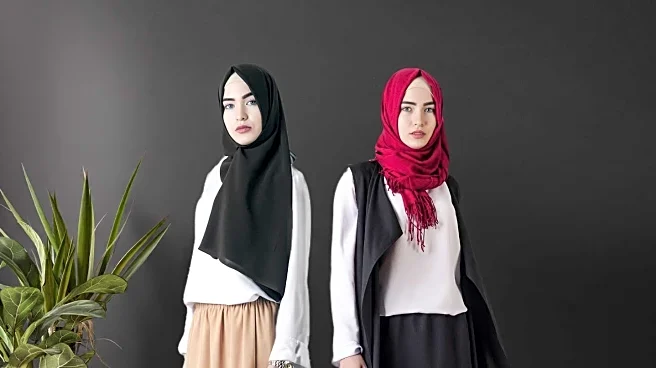What's Happening?
Israeli women are increasingly turning to modest fashion as a form of spiritual expression and empowerment, particularly in the wake of the Gaza war. Sivan Ruham Moshe, a boutique owner from Ramla, has become a central figure in this movement, offering free dresses to women who commit to dressing modestly. Her TikTok videos, which blend humor and sincerity, have gained significant traction, reflecting a broader cultural shift. This trend is not only a spiritual revival but also a lucrative business opportunity, with many women-run boutiques combining faith-based messages with marketing savvy.
Why It's Important?
The modest fashion movement in Israel highlights a complex interplay between faith, empowerment, and cultural identity. It offers women a way to assert their independence within the boundaries of religious modesty, challenging traditional norms. This trend also reflects a broader national mood, as modesty becomes linked to nationalism and spiritual solidarity. The movement's success on social media platforms like TikTok underscores the power of digital tools in shaping cultural narratives and influencing consumer behavior, particularly among younger generations.
What's Next?
As the modest fashion trend continues to grow, it may lead to increased dialogue about the role of women in religious and cultural contexts. The movement could inspire similar trends in other regions, promoting modesty as a form of empowerment rather than restriction. Additionally, the success of modest fashion businesses may encourage more women to enter the entrepreneurial space, leveraging social media to reach wider audiences. The ongoing cultural shift may also prompt discussions about the balance between tradition and modernity in fashion.
Beyond the Headlines
The modest fashion movement raises important questions about the intersection of faith and feminism. While it empowers women to define beauty on their own terms, it also risks reinforcing conservative norms that police women's bodies. The trend's popularity on social media highlights the potential for digital platforms to drive cultural change, but also the need for critical engagement with the messages they promote. As modest fashion becomes more mainstream, it may challenge existing fashion industry standards and encourage more inclusive representations of beauty.










